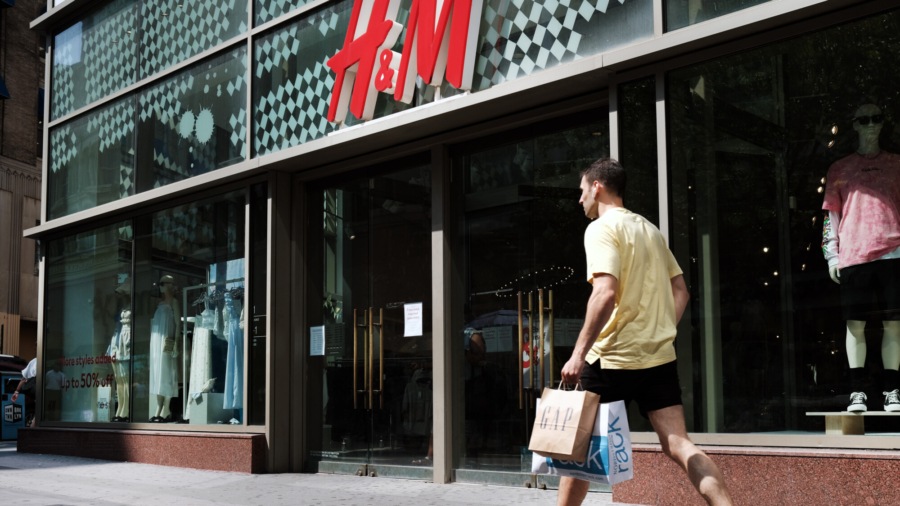U.S. consumer sentiment fell sharply in early August, with the University of Michigan confidence survey plumbing depths not seen in a decade as Americans expressed worry about personal finances, unemployment, and inflation.
The survey, released on Aug. 13, showed that the consumer sentiment index plunged from July’s reading of 81.2 down to 70.2, hitting a level not seen since 2011. The 13 percent slide was one the sharpest in percentage terms in the past 50 years, exceeded only by an 18.1-percent drop in 2008 and a 19.4-percent fall in April 2020, when the CCP (Chinese Communist Party) virus pandemic threw the economy into a tailspin.
Richard Curtin, the survey director, said in a statement that “the losses covered all aspects of the economy, from personal finances to prospects for the economy, including inflation and unemployment.”
The drop in sentiment was broad based, observed across all regions, and widespread across income, age, and education, Curtin added.
The survey’s index of current economic conditions fell to a reading of 77.9 from 84.5 in July while its consumer expectations gauge slid to 65.2 from 79.0 in July.
Curtin pointed to the public’s reaction to the spread of the Delta variant of the CCP virus, which causes COVID-19, as a likely factor sapping sentiment. Infections have doubled in the past two weeks to reach a six-month peak.
“There is little doubt that the pandemic’s resurgence due to the Delta variant has been met with a mixture of reason and emotion,” Curtin said. “Consumers have correctly reasoned that the economy’s performance will be diminished over the next several months, but the extraordinary surge in negative economic assessments also reflects an emotional response, mainly from dashed hopes that the pandemic would soon end.”
While the U.S. economy is expected to rebound this year at its fastest pace in decades after pandemic-driven shutdowns threw it into a recessionary tailspin, the recovery is showing some signs of cooling. Job openings in the United States surged to a record high of more than 10 million in June, while hiring lagged behind that figure by over 3 million, painting a picture of a recovery held back by business hiring woes.
Consumers responding to the survey also raised their expectations for inflation over a five-year horizon, which climbed to 3.0 percent in early August from 2.8 percent in July. One-year inflation expectations ticked down slightly to 4.6 percent, down from 4.7 percent in July, which was the highest reading in 12 years.
Consumer inflation stood at 5.4 percent in the 12 months through July, matching the June figure, which was the highest 12-month spike since 2008, according to the most recent consumer price index report from the Labor Department. At the same time, the producer price index jumped 7.8 percent over-the-year in July, the biggest 12-month increase on record, reinforcing broader concerns about inflation as higher production costs tend to filter down to consumers.
Commenting on the University of Michigan’s customer sentiment survey, Bankrate chief financial analyst Greg McBride said it suggests a possible clouding of the dynamics of the recovery, though he noted the results represent “a preliminary look that will be subject to further revision.”
“The initial look at consumer sentiment sends an ominous signal, with concerns about the Delta variant and the impact of inflation undercutting views of the economy now and in the months ahead,” McBride told The Epoch Times in an emailed statement.
A concern reflected in the survey results is that a fall in confidence among American shoppers could translate into a drop in consumer spending, a major driver of the economy.
“Bear in mind, the American consumer has a long history of saying one thing and doing another, where sentiment tanks but spending does not. Let’s hope this is one such instance,” McBride added.
Rising inflation has emerged as the Achilles’ heel of the economic recovery, erasing much of the benefit to workers from higher pay and heightening pressure on Fed officials to adjust policy to maintain price stability.
While Fed officials have said the current bout of inflation is transitory and ultra-easy monetary settings will stay in place until they see a more solid labor market recovery, they have acknowledged inflationary pressures and are discussing when to begin pulling back on the central bank’s extraordinary support measures for the economy.
Reuters contributed to this report.
From The Epoch Times


